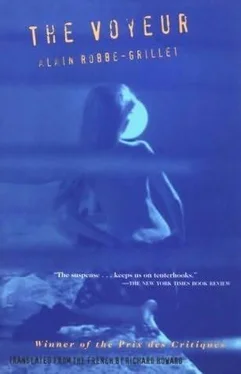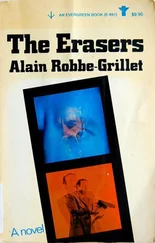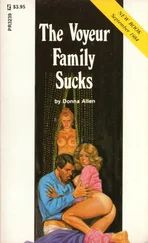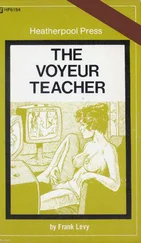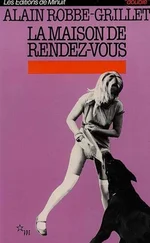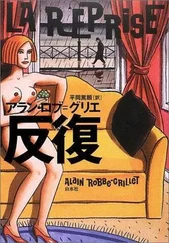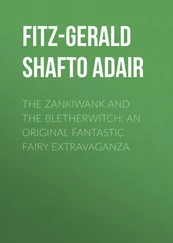These vertical threads disappear in their turn, giving way to a punctuation with neither direction nor movement—thick, frozen drops evenly covering the whole surface. Each of these, observed attentively, reveals a different, although uncertain, form in which only a single constant characteristic is preserved: the swollen, rounded base shading into black and touched at the center with a speck of light.
At this moment Mathias notices that the electric light hanging from the ceiling (in the middle of the room between the window and the bed) is on, shining with a yellow radiance at the end of its wire beneath a lamp shade of ground glass that has a rippled edge.
He stands up and goes to the door. There he flicks the chromium switch fastened to the door frame. The light goes out. For the light to be off the little polished metal ball must be in the “down” position—how logical. Mathias should have thought of that last night. He looks at the floor, then at the oil lamp on the pedestal table.
The tiles feel cold under his bare feet. About to get back into bed, he turns around, walks to the window, and leans over the table wedged into the recess. The liquid granulations covering the panes on the outside are impossible to see through. Although wearing only his nightshirt, Mathias opens the window.
It is not cold. It is still raining, but only a little; and there is no wind. The sky is uniformly gray.
Nothing remains of the sudden squall that drove the rain against the panes a few moments before. The weather is very calm now. A continuous light rain is falling; if it blurs the horizon it does not obstruct the view for shorter distances. On the contrary, it is as if in this new-washed air the objects near at hand profit from an additional luster—especially when they are light-colored to begin with—like that gull, for instance, arriving from the southeast (where the cliff falls away to the sea). Its already deliberate flight seems to become even slower as it loses altitude.
After turning around almost in the same place, in front of the window, the gull slowly rises again. But then it lets itself drop to the ground without once beating its wings, in a short, sure, widening spiral.
Instead of landing, the gull rises again, effortlessly, merely by changing the inclination of its wings. Then it turns once again, as if it were looking for its prey, or a perch—twenty yards from the house. It gains altitude with a few great strokes of its wings, describes a last loop, and continues its flight toward the harbor.
Mathias returns to his bed and begins to dress. After a summary toilet he puts on the rest of his clothes: the jacket and the duffle coat as well, since it is raining. He automatically thrusts his hands into the pockets. But he pulls out the right hand at once.
He heads toward the big cupboard in the corner, next to the window, between the chairs and the desk. The two doors are closed tight. The key is not in the keyhole. He opens one door with his fingertips—it opens easily. The cupboard was not locked. He opens it wide. It is absolutely empty. On the entire surface of its great, regularly-spaced shelves there is not even the smallest piece of cord.
The desk at the left of the cupboard is not locked either. Mathias drops the leaf in front, opens the many drawers one after another, inspects the pigeonholes. Here too everything is empty.
The five big drawers of the commode on the other side of the door can be opened just as easily, although they have no handles, merely wide openings of old—missing—locks into which Mathias thrusts the tip of his little finger in order to draw them toward him, getting a purchase on the wood as well as he can. But from top to bottom of the commode he finds nothing: not one piece of paper, not one old box top, not one piece of string.
He picks up his watch from the pedestal table next to him and fastens it around his left wrist. It is nine o’clock.
He crosses the room to where the memorandum book is lying on the square table in the window recess. He opens it to Thursday, picks up his pencil, and under the indication “slept well” adds in his most painstaking handwriting: “up at nine”—although he is unaccustomed to recording such details as this.
Then he stoops, seizes the little suitcase under the table, and puts the black memorandum book in it. After a moment’s reflection he puts the suitcase on the lowest shelf of the big empty cupboard in the right corner.
Having closed the door—forcing it a little in order to make it stay closed—he automatically thrusts his hands into his duffle coat pockets. The right hand again comes in contact with the gumdrops and the cigarettes. Mathias removes one of the latter from the pack and lights it.
He takes his wallet from his inside jacket pocket, removes a small newspaper clipping whose edge protrudes slightly beyond the other papers inside. He reads this printed text from beginning to end, chooses a word in it, and after tapping the ash from his cigarette, brings the red tip near the selected spot. The paper immediately turns brown. Mathias gradually presses harder. The brown spot spreads; the cigarette finally burns through the paper, leaving a round hole ringed with black.
Then, with the same deliberation and care, Mathias pierces a second identical hole at a certain distance from the first. Between them is only a thin blackened isthmus, scarcely a thirty-second of an inch wide at the point of tangency between the two circles.
New holes succeed these two, first grouped in pairs, then occurring in whatever space is left. The rectangle of newspaper is soon entirely perforated. Mathias then undertakes to make it disappear altogether, gradually burning whatever fragments remain with his cigarette. He begins at one comer and proceeds along the fuller parts of the lacework, taking care that no piece falls off unless it is a completely charred fragment. When he blows gently at the point of contact he notices that the line of incandescence gains ground a little more quickly. From time to time he inhales on the cigarette to quicken combustion of the tobacco; he knocks the ashes onto the tiles at his feet.
When nothing is left of the clipping but a tiny triangle which he holds between the points of two fingernails, Mathias sets this fragment on the floor, where he finishes it off. Thus no trace of the news item discernible to the naked eye remains. The cigarette itself has diminished, during the course of the operation, to a half-inch butt which it is only natural to toss out the window.
Mathias gropes at the bottom of his pocket for the two overlong butts he had recovered in the grass on the cliff top. He lights them one after the other in order to reduce them to a less noticeable size; he smokes them as rapidly as possible, inhaling puff after puff, and throws them in turn out the window.
His right hand again plunges into the pocket, this time bringing out a gumdrop. The transparent wrapper goes back into the bag while the brownish cube is put into his mouth. It is rather like a caramel.
Mathias buttons up his duffle coat. Since there is no wind, it will probably not rain in; no need to close the window. Mathias walks over to the door.
The moment he opens it to step into the hallway and cross the house—since the main entrance is on the other side—he decides that his landlady, if he should meet her, will doubtless want to talk to him. He leaves the door of his room ajar, making no noise. Some indistinct words reach him, probably from the kitchen at the other end of the hallway. Among several voices he recognizes his landlady’s. Two men—at least—are talking with her. It sounds as if they were trying not to raise their voices—as if they were even whispering from time to time.
Mathias closes the door carefully and turns back to the window. It is very easy to get out that way. Having hoisted himself up on the heavy little table, kneeling in order not to scratch the waxed wood, he straddles the sill, crouches on the outer stone ledge, and jumps down into the low grass of the moor. If the two men want to talk to him, they can just as well do it later on.
Читать дальше
